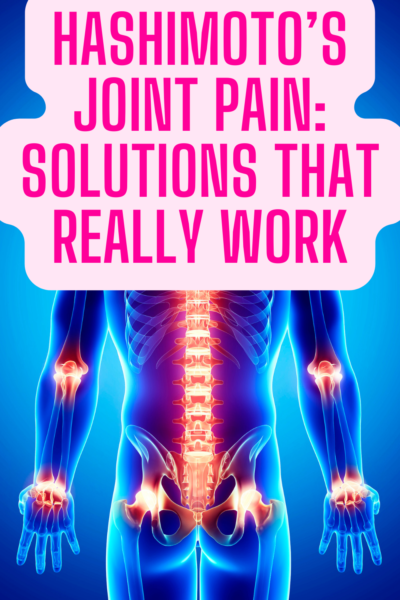Introduction
Hashimoto’s Joint Pain can be a major problem and quite painful. Hashimoto’s thyroiditis, a common autoimmune disorder, often brings with it a host of uncomfortable symptoms. One of the most challenging and persistent is joint pain. If you’re dealing with this frustrating symptom, you’re not alone. Understanding the root causes and discovering effective solutions can help you manage and even alleviate your discomfort. I’ve struggled with this and I still sometimes do so I know first hand what you can and must do to manage your Hashimoto’s Joint Pain.
Understanding the Connection Between Hashimoto’s and Joint Pain
Hashimoto’s thyroiditis occurs when the immune system mistakenly attacks the thyroid gland, leading to chronic inflammation and reduced thyroid function (hypothyroidism). This inflammation can spread throughout the body, affecting the joints and causing pain, stiffness, and swelling.
Joint pain in Hashimoto’s can be mistaken for other conditions like rheumatoid arthritis or osteoarthritis. However, the key difference lies in the autoimmune nature of Hashimoto’s, which requires a unique approach to treatment and management. You want to keep in mind though that it is possible to have both Hashimoto’s and arthritis. I know that I do.
Solutions for Managing Hashimoto’s Joint Pain
- Optimize Thyroid Hormone Levels
The first step in addressing joint pain associated with Hashimoto’s is to ensure that your thyroid hormone levels are properly balanced. This may require working closely with your healthcare provider to adjust your medication. Proper thyroid hormone levels can reduce inflammation and subsequently alleviate joint pain. - Anti-Inflammatory Diet
Diet plays a crucial role in managing Hashimoto’s symptoms, including joint pain. An anti-inflammatory diet can help reduce overall inflammation in the body. Consider incorporating the following into your diet:- Omega-3 Fatty Acids: Found in fatty fish, flaxseeds, and walnuts, omega-3s have powerful anti-inflammatory properties.
- Turmeric: This spice contains curcumin, which has been shown to reduce inflammation.
- Leafy Greens: Vegetables like spinach, kale, and Swiss chard are rich in antioxidants and can help combat inflammation.
- Gluten-Free Options: Some individuals with Hashimoto’s find that eliminating gluten reduces joint pain, as gluten can trigger inflammation in those with autoimmune conditions.
- No Sugar and processed foods. These are a big trigger for me and pretty much everyone. If you want to make one change that will have a big impact on your life, stop eating sugar and processed foods.
- Regular Exercise
Exercise is crucial for maintaining joint flexibility and reducing pain. Low-impact activities such as swimming, yoga, and walking can help keep joints moving without exacerbating pain. Additionally, regular exercise can improve mood and reduce fatigue, both of which are often associated with Hashimoto’s. I always exercise for at least 15 minutes within the first hour of waking up. I find that stretching is really helpful. I also go swimming at least three times per week. - Stress Management
Stress can exacerbate autoimmune symptoms, including joint pain. Incorporating stress-reducing activities into your routine can help manage pain. Consider practices like:- Mindfulness Meditation: Helps in calming the mind and reducing stress hormones that can trigger inflammation.
- Breathing Exercises: Simple techniques can reduce stress and promote relaxation.
- Journaling: Writing about your experiences can be a powerful way to process emotions and reduce stress. Journals like those from Silk and Sonder can be particularly helpful in fostering a daily self-care routine.
- Supplements
Certain supplements can support joint health and reduce inflammation:- Vitamin D: Often deficient in people with Hashimoto’s, adequate vitamin D levels can help reduce joint pain.
- Selenium: This mineral is important for thyroid health and can reduce inflammation in people with Hashimoto’s.
- Magnesium: Supports muscle and nerve function, and can help reduce muscle aches and stiffness.
- Always consult with a healthcare provider before starting any new supplements.
- Adequate Rest and Sleep
Quality sleep is essential for healing and reducing inflammation. Aim for 7-9 hours of sleep each night. Creating a sleep-friendly environment, such as a cool, dark room and a regular bedtime routine, can help improve sleep quality. Not sleeping will increase your pain and cause a lot of other thyroid and other autoimmune challenges. - Work with a Health Coach
Navigating Hashimoto’s and its associated symptoms like joint pain can be challenging. A health coach can provide personalized guidance and support, helping you implement lifestyle changes, manage stress, and develop a diet and exercise plan that works for you. By working with a coach, you can create a sustainable path to reducing joint pain and improving your overall well-being. I’m happy to work with you if you need some help, so please reach out to me.
Final Thoughts
Living with Hashimoto’s thyroiditis can be challenging, especially when dealing with joint pain. However, by taking a holistic approach that includes optimizing thyroid hormone levels, adopting an anti-inflammatory diet, incorporating regular exercise, managing stress, and seeking the guidance of a health coach, you can significantly reduce your symptoms and improve your quality of life.
Remember, every person’s experience with Hashimoto’s is unique, so it may take some time to find the solutions that work best for you. But with persistence and the right strategies, relief is possible.

Did this help you? If so, I would greatly appreciate a share on Facebook, twitter, linkedin, or pinterest.
My Favorite Products (Affiliate links- if you make a purchase I may earn a small commission)
Thrive Market - healthy gluten free, sugar free and speciality online food and household products
Silk and Sonder Monthly Journals and Planners
My Portable Infrared Sauna
Self Care Journal
Martie discounted food
Olipop - healthy soda with probiotics and prebiotics
Digestion Kit
Stress Oils








